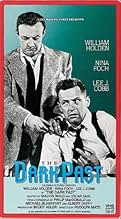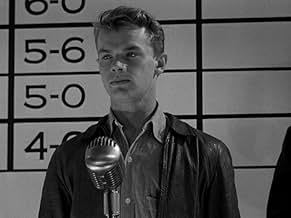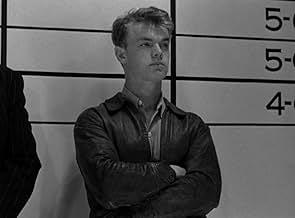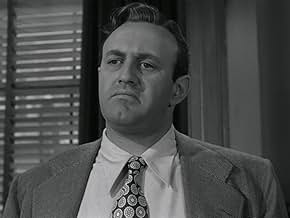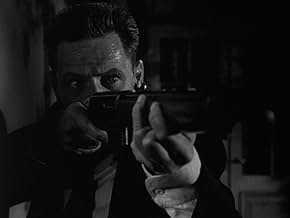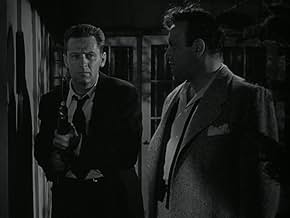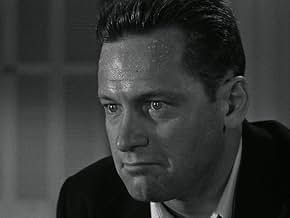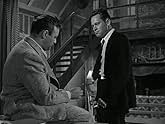AVALIAÇÃO DA IMDb
6,3/10
2,4 mil
SUA AVALIAÇÃO
Um psicopata fugitivo que leva a família e os vizinhos do psicólogo policial como refém revela um pesadelo recorrente para o médico.Um psicopata fugitivo que leva a família e os vizinhos do psicólogo policial como refém revela um pesadelo recorrente para o médico.Um psicopata fugitivo que leva a família e os vizinhos do psicólogo policial como refém revela um pesadelo recorrente para o médico.
- Direção
- Roteiristas
- Artistas
- Prêmios
- 2 vitórias no total
Charles Cane
- Sheriff
- (não creditado)
Bill Cartledge
- Arrested Man Leaving Wagon
- (não creditado)
Tom Coleman
- Detective
- (não creditado)
G. Pat Collins
- Al's Father
- (não creditado)
Ellen Corby
- Agnes
- (não creditado)
Lester Dorr
- First Man in Police Line-Up
- (não creditado)
Edward Earle
- McCoy
- (não creditado)
Avaliações em destaque
The Dark Past is directed by Rudolph Maté and adapted by Malvin Wald, Oscar Saul, Philip MacDonald, Michael Blankfort and Albert Duffy from the play Blind Alley written by James Warwick. It stars William Holden, Nina Foch, Lee J. Cobb, Adele Jergens, Stephen Dunne and Lois Maxwell. Music is by George Duning and cinematography by Joseph Walker.
Al Walker Breaks Jail!
One from a number of classic era Hollywood's ventures into Freudian thrillers. Here we have Holden as escaped convict Al Walker, who along with his loyal crew hold hostage psychologist Dr. Andrew Collins (Cobb) and his guests at the doctor's remote country retreat. With Walker clearly unstable of mind and often showing a cold blooded streak, the good doctor, the calmest man in the house, slowly tries to draw out of Walker the root of his murderous leanings.
James Warwick's play had already had a film adaptation in 1939 as Blind Alley (Charles Vidor), but such was the advent of film noir and crime films of similar ilk, the source material was ripe for a remake in the late 40s. Maté's film is doubly reliant on strong acting performances and strength of subject matter, the former is no problem at all, with Cobb methodically excellent, Holden twitchy and coiled spring like and Foch smooth foil for both of them.
The latter issue isn't totally successful, though, the picture is very talky anyway, but much of the psycho-babble talk about conscious states, dreams, sensor bands and damage childhoods is handled so matter of fact, it's never really convincing as narrative thrust and it slow builds to a finale that lacks dramatic oomph. It's annoying really because Maté paints it in light and shade and a dream sequence, stripped back to negative form, is surreal excellence and befitting the interesting core basics of the psychological issues on the page.
It's definitely worth a look by those interested in the Freud influenced entries in the film noir cycle, while fans of hostage dramas like The Desperate Hours and The Petrified Forest will enjoy the character dynamics on show. But it's not all it can be and the handling of the crime and mental health equation is just too short changed to matter. 6.5/10
Al Walker Breaks Jail!
One from a number of classic era Hollywood's ventures into Freudian thrillers. Here we have Holden as escaped convict Al Walker, who along with his loyal crew hold hostage psychologist Dr. Andrew Collins (Cobb) and his guests at the doctor's remote country retreat. With Walker clearly unstable of mind and often showing a cold blooded streak, the good doctor, the calmest man in the house, slowly tries to draw out of Walker the root of his murderous leanings.
James Warwick's play had already had a film adaptation in 1939 as Blind Alley (Charles Vidor), but such was the advent of film noir and crime films of similar ilk, the source material was ripe for a remake in the late 40s. Maté's film is doubly reliant on strong acting performances and strength of subject matter, the former is no problem at all, with Cobb methodically excellent, Holden twitchy and coiled spring like and Foch smooth foil for both of them.
The latter issue isn't totally successful, though, the picture is very talky anyway, but much of the psycho-babble talk about conscious states, dreams, sensor bands and damage childhoods is handled so matter of fact, it's never really convincing as narrative thrust and it slow builds to a finale that lacks dramatic oomph. It's annoying really because Maté paints it in light and shade and a dream sequence, stripped back to negative form, is surreal excellence and befitting the interesting core basics of the psychological issues on the page.
It's definitely worth a look by those interested in the Freud influenced entries in the film noir cycle, while fans of hostage dramas like The Desperate Hours and The Petrified Forest will enjoy the character dynamics on show. But it's not all it can be and the handling of the crime and mental health equation is just too short changed to matter. 6.5/10
"The Dark Past" is a remake of the 1939 picture "Blind Alley" which starred Chester Morris and Ralph Bellamy. In this newer version, William Holden and Lee J. Cobb play these roles.
The film begins with a prison break. Al Walker (Holden) is the leader of the band of thugs and he murders the Warden (who they've taken hostage) just for kicks. He decides the gang will NOT hold up in one of the empty vacation homes nearby but one with people in it. This way, he figures, the cops won't suspect where they are hiding. The home happens to be filled with quite a few people, as Dr. Collins and his family are hosting a dinner party. Soon, all of them are prisoners and hoping that the gang doesn't kill them. As for Dr. Collins, he is a psychiatrist and plays a mental game of cat and mouse with Walker.
In many ways, this film is reminiscent of "Suddenly" and "The Desperate Hours"---both films about families being held hostage by killers. All of these are very good films and what sets this film apart is the psychiatrist angle. I enjoyed the film, though as a trained psychotherapist I should point out that Dr. Collins' approach is very Freudian...and rarely used today by therapists. Dream interpretation and mother blaming are rarely discussed in therapy today. And, folks like Walker are NOT cured so quickly and easily!! Ridiculous, sure...but still entertaining.
While I rarely say this, I think this film is actually a bit better than the original. Much of this is due to William Holden's more realistic and less sensationalistic performance.
The film begins with a prison break. Al Walker (Holden) is the leader of the band of thugs and he murders the Warden (who they've taken hostage) just for kicks. He decides the gang will NOT hold up in one of the empty vacation homes nearby but one with people in it. This way, he figures, the cops won't suspect where they are hiding. The home happens to be filled with quite a few people, as Dr. Collins and his family are hosting a dinner party. Soon, all of them are prisoners and hoping that the gang doesn't kill them. As for Dr. Collins, he is a psychiatrist and plays a mental game of cat and mouse with Walker.
In many ways, this film is reminiscent of "Suddenly" and "The Desperate Hours"---both films about families being held hostage by killers. All of these are very good films and what sets this film apart is the psychiatrist angle. I enjoyed the film, though as a trained psychotherapist I should point out that Dr. Collins' approach is very Freudian...and rarely used today by therapists. Dream interpretation and mother blaming are rarely discussed in therapy today. And, folks like Walker are NOT cured so quickly and easily!! Ridiculous, sure...but still entertaining.
While I rarely say this, I think this film is actually a bit better than the original. Much of this is due to William Holden's more realistic and less sensationalistic performance.
The Dark Past may very well have been a turning point in the career of William Holden. As you remember Holden had a dual contract with Columbia and Paramount and I'm sure Billy Wilder at Paramount must have seen The Dark Past before casting Holden in Sunset Boulevard. This B film for Columbia was unlike any of the 'smiling jim' roles that Holden had played up to now.
The Dark Past has only a 75 minute running time and was playing the bottom end of Columbia double bills when it first came out. It's a remake of another Columbia film Dark Past with Chester Morris in Holden's part as the escaped killer. The part of the psychiatrist played by Lee J. Cobb here was played by Ralph Bellamy in the previous production.
Cobb is now a police psychiatrist, but wasn't always; in fact as he relates in flashback he was a professor when he ran into Holden who was escaping from jail with his mob and his moll. They take refuge in Cobb's summer house where Cobb and family are entertaining guests.
Lee is as cool as he would be emerging from a refrigerator. He starts getting under Holden's skin with his training exposing the real cause of his killer personality. Most disarming in every sense of the word.
If it were only that easy. Still the film in its short run does keep one in suspense. A lot like the duel of minds between Humphrey Bogart and Fredric March in The Desperate Hours. Also look for a very good performance by Nina Foch as Holden's moll who unwittingly leads to her man's downfall when she asks Cobb to find out about a recurrent nightmare Holden has.
If a dose of Freud could only cure all bad behavior.
The Dark Past has only a 75 minute running time and was playing the bottom end of Columbia double bills when it first came out. It's a remake of another Columbia film Dark Past with Chester Morris in Holden's part as the escaped killer. The part of the psychiatrist played by Lee J. Cobb here was played by Ralph Bellamy in the previous production.
Cobb is now a police psychiatrist, but wasn't always; in fact as he relates in flashback he was a professor when he ran into Holden who was escaping from jail with his mob and his moll. They take refuge in Cobb's summer house where Cobb and family are entertaining guests.
Lee is as cool as he would be emerging from a refrigerator. He starts getting under Holden's skin with his training exposing the real cause of his killer personality. Most disarming in every sense of the word.
If it were only that easy. Still the film in its short run does keep one in suspense. A lot like the duel of minds between Humphrey Bogart and Fredric March in The Desperate Hours. Also look for a very good performance by Nina Foch as Holden's moll who unwittingly leads to her man's downfall when she asks Cobb to find out about a recurrent nightmare Holden has.
If a dose of Freud could only cure all bad behavior.
Lee J. Cobb is a psychiatrist who works to discover "The Dark Past" of convict William Holden in this 1948 drama that also stars Nina Foch and Adele Jurgens. Two of Hollywood's favorite subject matters are part of the film plot: The post-war obsession with psychiatry and a hostage situation, of which there have been many in films over the years. Like Bogart in "The Desperate Hours," Holden's an escaped convict with a gang that holes up in someone's home while waiting for a ride that doesn't arrive when it's supposed to. And, like the later "Desperate Hours," the couple has a child that tries to escape. In "The Desperate Hours," you wanted to kill the kid; at least here, he doesn't cause as much trouble.
Psychiatry in America was really just being explored in film, and it was as a result of the trauma soldiers suffered in World War II and the problems they had when they came home. The script is simplistic and dated, but the performances are good. Holden is terrific as the on-the-edge convict tortured by partial hand paralysis and a recurring nightmare from an incident in his childhood; young, pretty Nina Foch is his girlfriend who loves him but is terribly hurt by his actions. When I was growing up, the striking Foch was in her forties and a constant presence in television, usually playing a neurotic mess. She still acts and is a very prominent drama teacher in Los Angeles. It was wonderful to see her in these early days - she made a fine ingénue. Cobb is convincing as a psychiatrist who keeps his cool as he tries to help the young man.
After William Holden's big splash at the age of 21 in "Golden Boy" in 1939, his career settled into a series of light leading man roles that took him nowhere. Superstardom didn't hit until 1950's Sunset Boulevard. One of the comments on IMDb remarked that in "Golden Boy," he looked like Tom Hanks, which stuck in my mind as I was watching "The Dark Past." Well, it's the strangest version of separated at birth that I've ever seen, but there is the oddest resemblance between these two stars. Here, with his hairline exposed, you can really see the similarity in the shape of Holden's face to Hanks', and there's even a similarity in profile and around the eyes. You'd never catch it unless someone mentioned it to you or you've seen "Golden Boy" where Holden is nearly unrecognizable - and then once you pick it up, it's totally distracting.
The other odd thing about this film which says something about our society today is that these people were getting together for a casual evening in a country home and they were all dressed to the nines - even the criminals were wearing suits and ties! Times sure have changed. Despite this and other dated elements of "The Dark Past," William Holden, a tremendous star, is always worth a look.
Psychiatry in America was really just being explored in film, and it was as a result of the trauma soldiers suffered in World War II and the problems they had when they came home. The script is simplistic and dated, but the performances are good. Holden is terrific as the on-the-edge convict tortured by partial hand paralysis and a recurring nightmare from an incident in his childhood; young, pretty Nina Foch is his girlfriend who loves him but is terribly hurt by his actions. When I was growing up, the striking Foch was in her forties and a constant presence in television, usually playing a neurotic mess. She still acts and is a very prominent drama teacher in Los Angeles. It was wonderful to see her in these early days - she made a fine ingénue. Cobb is convincing as a psychiatrist who keeps his cool as he tries to help the young man.
After William Holden's big splash at the age of 21 in "Golden Boy" in 1939, his career settled into a series of light leading man roles that took him nowhere. Superstardom didn't hit until 1950's Sunset Boulevard. One of the comments on IMDb remarked that in "Golden Boy," he looked like Tom Hanks, which stuck in my mind as I was watching "The Dark Past." Well, it's the strangest version of separated at birth that I've ever seen, but there is the oddest resemblance between these two stars. Here, with his hairline exposed, you can really see the similarity in the shape of Holden's face to Hanks', and there's even a similarity in profile and around the eyes. You'd never catch it unless someone mentioned it to you or you've seen "Golden Boy" where Holden is nearly unrecognizable - and then once you pick it up, it's totally distracting.
The other odd thing about this film which says something about our society today is that these people were getting together for a casual evening in a country home and they were all dressed to the nines - even the criminals were wearing suits and ties! Times sure have changed. Despite this and other dated elements of "The Dark Past," William Holden, a tremendous star, is always worth a look.
The return of variously shell-shocked, amnesiac or otherwise afflicted soldiers from the front precipitated a spate of postwar movies purporting to delve into the mysteries of the human psyche. In most cases, psychology was presented either as a sinister black art (to be viewed with the utmost suspicion) or in a laughingly simplistic way. The Dark Past, grindingly earnest, opts for the latter path. Wrong'un William Holden, visibly chafing under the constraints of the script, invades a home and holds its occupants -- family and guests -- hostage. He has the bad luck to find among them psychoanalyist Lee J. Cobb, puffing away at the inevitable pipe, who turns the ordeal into a teaching opportunity. Slowly he breaks down Holden's wall of defenses, until a childhood memory emerges....This Freudian breakthrough, of course, occurs in record time, though for viewers it may seem like a big chunk of eternity. Mercifully, Adele Jergens sashays in and out a few times to lower the picture's tone to tolerable. The Dark Past is a period-piece, of some interest to fans of the noir cycle, but its stagey insights and dated dramaturgy have not aged gracefully.
Você sabia?
- CuriosidadesThe re-creation of Al's dream uses a few seconds of footage from Alucinação (1939), the earlier film version of this story; specifically the shot approaching the saloon, panning to see the policemen following the narrator, and panning back to the saloon side entrance.
- Erros de gravaçãoAl takes a book off of Andrew's book shelf and opens it around page 50 or 60, but in the next closeup, the page Al is looking at the start of Chapter 22. It's highly unlikely that a scholarly book about psychology would average under three pages per chapter.
- ConexõesReferenced in Discovering Film: William Holden (2015)
Principais escolhas
Faça login para avaliar e ver a lista de recomendações personalizadas
- How long is The Dark Past?Fornecido pela Alexa
Detalhes
- Tempo de duração
- 1 h 13 min(73 min)
- Cor
- Proporção
- 1.37 : 1
Contribua para esta página
Sugerir uma alteração ou adicionar conteúdo ausente

